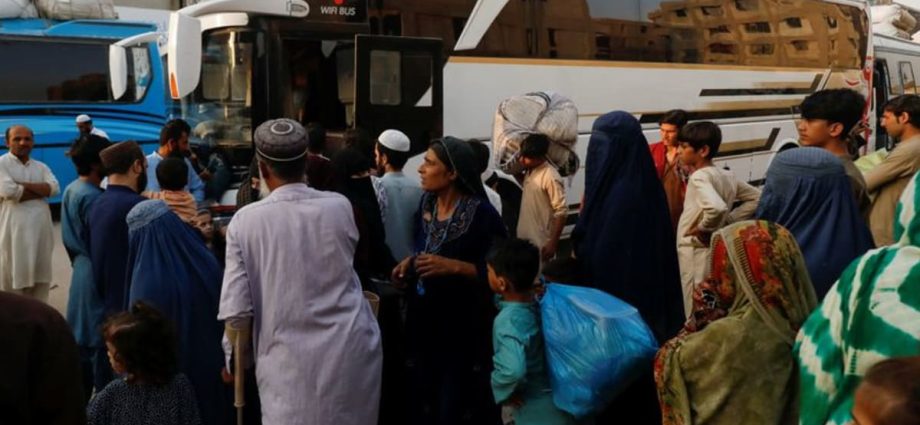
They will be processed at “holding centres” and then deported, he told reporters, adding that women, children and the elderly would be treated “respectfully.” Reuters could not determine how long they might be detained in the centers.
Pakistani citizens who help undocumented migrants obtain false identities or employment will face legal action, Bugti warned.
“Post-November will be very chaotic and there will be chaos in the Afghan refugee camps,” said Abbas, the advocate.
FEAR AND DESPERATION
The UN refugee agency UNHCR and the International Organization for Migration (IOM) said Pakistan’s plans create “serious protection risks” for women and girls forced to leave. Restrictions in Afghanistan, especially on female NGO workers, have led to shrinking employment opportunities for women there.
While Pakistan says it will not target Afghans with legal status, many with proper documents also find themselves being targeted, according to migrant advocates.
UNHCR data shows that 14,700 documented Afghans left Pakistan as of Oct 18 2023, more than double the 6,039 in all of last year.
The agency said in a statement that 78 per cent of recent returning Afghans it spoke to cited fear of arrest in Pakistan as reason for their departure.
There are more than 2.2 million Afghan migrants in Pakistan with some form of documentation recognized by the government that conveys temporary residence rights.
Roughly 1.4 million of them hold Proof of Registration (PoR) cards that expired on June 30, leaving them vulnerable. Islamabad says it will not take action against people with invalid cards, but Abbas told Reuters that police harassment has ramped up since the expulsion threat.
More than a dozen migrants that Reuters spoke to corroborated the claim, which was also repeated by Taliban diplomats in Pakistan.
Karachi East Police Superintendent Uzair Ahmed told Reuters that while there might be “one or two” instances of harassment, it was non-systemic and offenders would be investigated.
Many Afghans with legal status told Reuters they feel compelled to leave out of fear of being separated from family members without documentation.
Hajira, a 42-year-old widow in Sohrab Goth, told Reuters she has the right to remain in Pakistan, as do two of her four sons. The other two don’t.
Fearing separation from her children, she plans on leaving with her sons and their families before the deadline expires.
Majida, a 31-year-old who was born in Pakistan, lives with her husband and their six children in an apartment complex in Sohrab Goth, a squalid suburb whose narrow streets are filled with heaps of garbage.
She said her family has PoR cards but has still been subject to harassment: a brother-in-law and nephew were detained by local authorities for several hours before being released. Reuters could not independently verify her account.
When Majida fell ill earlier in October, her husband refused to help her pick up medication at a nearby pharmacy out of fear of detention.
“We don’t have a home or work (in Afghanistan),” she said. “Obviously, we think of Pakistan as our home, we’ve been living here for so long.”
PRESSURE IN AFGHANISTAN
Back in Afghanistan, the influx of returning migrants and refugees has exerted pressure on already limited resources that are stretched by international sanctions on the banking sector and cuts in foreign aid after the Taliban takeover.
The Afghan Ministry of Refugees says it intends to register returnees and then house them in temporary camps. The Taliban administration said it will try to find returnees jobs.
The unemployment rate more than doubled from the period immediately before the Taliban takeover to June 2023, according to the World Bank. UN agencies say around two-thirds of the population is in need of humanitarian aid.
“We had our own barbecue shop and meat shop here. We had … everything. We were guests here,” said 18-year-old Muhammad just before he boarded Azizullah’s bus back to Afghanistan.
“You should think of it this way: that the country is kicking out its guests.”

